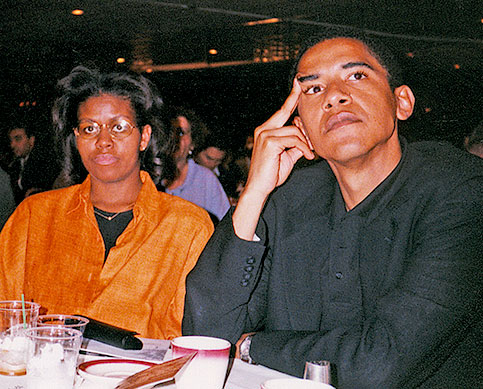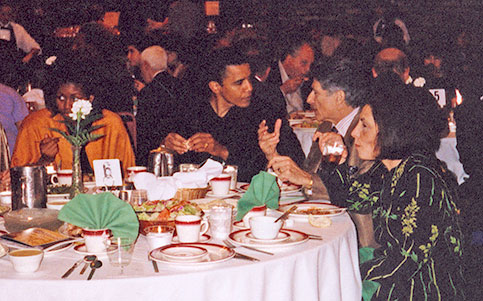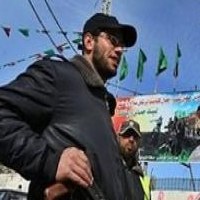What Barack Obama really thinks about Israel.
In an interview to the New Yorker, Haim Saban (a multimillionaire and donor to Democratic campaigns) is an open book about his experiences with Barack Obama. He told Connie Bruck:
According to Saban, in June, 2008, after the primary battles [between Clinton and Obama] finally ended, Barack Obama called and asked for his help.
“I said to him, Let me coördinate a meeting between you and some of the people who supported Hillary through me. We have a few things we need to clarify.”
For example, Saban continued, “Obama was asked the same question Hillary was asked—‘If Iran nukes Israel, what would be your reaction?’ Hillary said, ‘We will obliterate them.’ We . . . will . . . obliterate . . . them. Four words, it’s simple to understand. Obama said only three words. He would ‘take appropriate action.’ I don’t know what that means. A rogue state that is supporting killing our men and women in Iraq; that is a supporter of Hezbollah, which killed more Americans than any other terrorist organization; that is a supporter of Hamas, which shot twelve thousand rockets at Israel—that rogue state nukes a member of the United Nations, and we’re going to ‘take appropriate action’! ” His voice grew louder. “I need to understand what that means. So I had a list of questions like that. And Chicago”—Obama campaign headquarters—“could not organize that meeting. ‘Schedule, heavy schedule.’ I was ready and willing to be helpful, but ‘helpful’ is not to write a check for two thousand three hundred dollars. It’s to raise millions, which I am fully capable of doing. But Chicago wasn’t able to deliver the meeting, so I couldn’t get on board.”
Saban offered to fly his group of Hillary supporters to meet with Obama anywhere in the country, but he was told that it couldn’t be arranged. “Haim understands message—Obama didn’t have time for him,” a close adviser said. “After that, he met with McCain. It went that far. But, ultimately, he felt he could not abandon the Democratic Party, even though he did not like its candidate.”
…He has not spoken with Obama since he became President, Saban said, “because he has no need to speak to me—or, at least, he thinks he has no need to.” He has refused on two occasions to co-chair fund-raising dinners for the President.
In early March, shortly before Vice-President Joe Biden visited Israel, he invited a group of prominent Jews to the Vice-President’s residence. Most were leaders of Jewish organizations or close Biden supporters—and then there was Saban. It was his first invitation from the Obama White House.
In the meeting, Saban said that the Administration “may want to consider the fact that their relationship with their Israeli wife is more valuable than their newfound relationship with their Arab mistresses.” (Later, he said, “Everybody laughed! No one says things like that in such meetings.”) He exhorted Biden to reassure the Israeli people that the Administration considers the bond between the two countries unbreakable—and he advised that Biden do so at about eight in the evening, on Channel 2, in order to reach the maximum number of Israelis. And, airing a grievance he had been nursing ever since the President’s Cairo speech, last June, Saban insisted that Biden correct what he considered to be Obama’s cardinal error—the implication that Israel’s creation was justified by the Holocaust, rather than by millennia of Jewish history. Dan Shapiro, a member of the White House Middle East team who had worked on the Cairo speech, interjected that the speech did not say that, but Saban disagreed. After the meeting broke up, one participant recalled, Saban animatedly told Shapiro that Obama had made his career—becoming President and a Nobel Prize winner—by the power of his speeches, so he ought to be aware of the importance of language.
…At the Forum, he repeated something that he had been saying, heatedly, for months—that Obama’s first call, after his Inauguration, was to the Palestinian President Mahmoud Abbas, known as Abu Mazen. Deputy Secretary of State James Steinberg told Saban that was not the case. Later, when asked where he had got the misinformation, Saban said, “I thought I had read this somewhere. One thing is for sure—he called Abu Mazen before he called the Israelis.” (In fact, the White House says the order of calls was Hosni Mubarak, the President of Egypt; Ehud Olmert, who was then the Prime Minister of Israel; and Abbas.)
The crisis in U.S.-Israel relations that followed Biden’s trip, when Israel announced its construction plans in East Jerusalem, seems only to have hardened Saban’s view of Obama. “I don’t think Haim feels particularly positive about Bibi’s performance,” Saban’s close adviser said. “But he certainly isn’t happy about Obama’s.”
…Last August, when Saban was in Washington, he met with both Hillary Clinton and Rahm Emanuel, and he argued that Obama should travel to Israel to speak to the Israeli people. That has been his continuing message. “I told friends of mine in the White House, ‘He goes to Saudi Arabia, he goes to Cairo, he doesn’t even make a stop in Jerusalem?’ If he thinks that having a Seder at the White House is going to mitigate that—no, it’s not.”
Read the full interview: here.

Michelle Obama and Barack Obama listen to Professor Edward Said give the keynote address at an Arab community event in Chicago, May 1998. (Photo: Ali Abunimah)
Obama’s spiritual mentor
Ed Lasky writes in the American Thinker [march 22, 2007]:
Obama has given a great deal of credit to the influence his church and his minister have had upon him. While his campaign has called his church the United Church of Christ and thus characterized it as just one of many mainstream churches within that denomination, it is in fact the Trinity United Church of Christ and follows a particularly Afro-centric view of Christianity, emphasizing a Black Work Ethic, commitment to a Black Value System, and an allegiance to all Black Leadership that follows the Black Value System. A brief review of its philosophy shows that this is not your everyday Christian parish and perhaps accounts for his campaign’s dropping of the name “Trinity” when discussing his church membership…
Given the anti-Semitism that is sadly so often associated with other leaders and groups that have emphasized black separatism and empowerment (think Louis Farrakhan, Jesse Jackson, and Al Sharpton) perhaps some qualms might be warranted, particularly given some of the actions and statements of the Church’s minister.
Reverend Jeremiah Wright, Jr. is the long-time Pastor of Obama’s church, and Obama has credited him as being an inspiration and guiding light for him. He is a spiritual mentor to Obama and coined the term the “audacity of hope” that Obama has essentially made a theme of his campaign as well as the title of a book. He also has, in the words of the Chicago Tribune, a militant past.
Moreover, Pastor Wright has beliefs that might disturb some of Obama’s supporters. He is a believer in “liberation theology,” which makes the liberation of the oppressed a paramount virtue. The language of liberation all too often veers off into anti-Jewish rants.
Obama’s anti-Israel friends
Ali Abunimah is a well-known Chicago-based activist for Palestinian causes. He has a harshly anti-Israel attitude. He has also written that he had met Obama about half a dozen times at various Palestinian and Arab-American events, including a May 1998 community fundraiser at which the late Edward Said was the keynote speaker.
…Edward Said was a severe critic of Israel; he developed a school of study about the Middle East based on denunciation of so-called “Orientalism” that has influenced many Middle Eastern professors to take an anti-Israel view.

From left to right, Michelle Obama, then Illinois state senator Barack Obama, Columbia University Professor Edward Said and Mariam Said at a May 1998 Arab community event in Chicago at which Edward Said gave the keynote speech. (Image from archives of Ali Abunimah)
…Abunimah wrote an article [march 04, 2007] critical of Obama’s very recent and somewhat lukewarm outreach to the Israel’s supporters. He wrote that years ago Obama had been forthright in his criticism of American foreign policy and had called for an even-handed approach to the Palestinian-Israel conflict. But Abunimah detected a change as Obama began his Senate run.
Over the years since I first saw Obama speak I met him about half a dozen times, often at Palestinian and Arab-American community events in Chicago including a May 1998 community fundraiser at which Edward Said was the keynote speaker. In 2000, when Obama unsuccessfully ran for Congress I heard him speak at a campaign fundraiser hosted by a University of Chicago professor. On that occasion and others Obama was forthright in his criticism of US policy and his call for an even-handed approach to the Palestinian-Israeli conflict.
The last time I spoke to Obama was in the winter of 2004 at a gathering in Chicago’s Hyde Park neighborhood. He was in the midst of a primary campaign to secure the Democratic nomination for the United States Senate seat he now occupies. But at that time polls showed him trailing.
As he came in from the cold and took off his coat, I went up to greet him. He responded warmly, and volunteered, “Hey, I’m sorry I haven’t said more about Palestine right now, but we are in a tough primary race. I’m hoping when things calm down I can be more up front.” He referred to my activism, including columns I was contributing to the The Chicago Tribune critical of Israeli and US policy, “Keep up the good work!”
…If disappointing, given his historically close relations to Palestinian-Americans, Obama’s about-face is not surprising. He is merely doing what he thinks is necessary to get elected and he will continue doing it as long as it keeps him in power.
Ed Lasky continues:
In an interview [march 2004] he gave prior to the U.S. Senate primary election with the Chicago Jewish News, when asked about the Israeli security fence, Obama replied:
“the creation of a wall dividing the two nations is yet another example of the neglect of this Administration in brokering peace.”
The security fence has saved the lives of many innocent people: terror attacks against Israelis have plummeted. After suffering waves of suicide bombings, losing more than 900 people and after suffering thousands of casualties, Israel learned that indeed “fences can be good neighbors”. One wishes that Senator Obama could appreciate the toll that this endless wave of terror had on the men, women and children who had to bear it. Furthermore, it is not a wall (except for a small part, comprising less than 5% of the length) and there are not two nations involved in the dispute-there is no Palestinian nation, as of yet.
Senator Obama also stated during his Iowa trip, “Nobody is suffering more than the Palestinian people” which not only ignores the Israelis who have been terrorized and killed for years but also ignores refugees from the genocide in Darfur or the daily terror the Iraqis are experience from Muslim on Muslim violence. Instead, by identifying the Palestinians as suffering, he implicitly seems to be blaming the Israelis for their plight.
No wonder Barack Obama is so popular among denizens of Hollywood: they certainly have an eye for those who can create an image, can generate a buzz that compels others to suspend their disbelief, and who can induce a trance-like stargazing.
But the fact is that Barack Obama does have a record to run on and it is a record that should be of concern to those who support America’s relationship with Israel.



 RSS
RSS










Obama’s True Beliefs #israel http://j.mp/btJCpW
RT @CrethiPlethi: Obama’s True Beliefs #israel http://j.mp/btJCpW http://ff.im/k52WZ
[…] This post was mentioned on Twitter by Rem Nant. Rem Nant said: RT @CrethiPlethi: Obama’s True Beliefs #israel http://j.mp/btJCpW http://ff.im/k52WZ […]
RT @CrethiPlethi: Obama’s True Beliefs #israel http://j.mp/btJCpW
See the oustanding documentation made by Eric Friedler about the truth of the Armenian Genocide, with many proofs, long time hidden in order not to harm Turkey. The documentation was shown twice on two notable German TV stations in April this year and will be shown again in September. This is a very great sign as it’s a German production although it depicts the complicity of Germany (= Turkey’s Ally) in the Armenian Genocide.
PLEASE TAKE SOME TIME, WATCH IT AND SPREAD THE LINK.
––––––––––––––––––––––––––––––––––––––––––––––––––
http://www.youtube.com/view_play_list?p=B4306054D5680A18
––––––––––––––––––––––––––––––––––––––––––––––––––
THANK YOU.